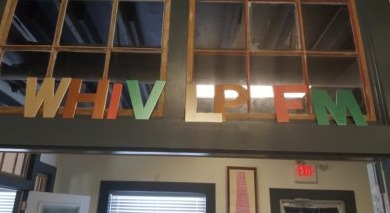
WHIV 102.3 FM (Photo by: Ishan Patel)
Low Power FM stations serve as a medium to give local citizens more choices in alternative media, but starting and maintaining an LPFM station is not easy. LPFMs are community-based non-commercial radio stations that operate at 100 watts or fewer, and as a result, they face many challenges. Between generating enough listenership, abiding by FCC regulations, avoiding interference with other stations, and serving the community, LPFM stations have a tough job. But, we know what they say about tough jobs–somebody has got to do it, and one of those “somebodies” is WHIV, 102.3 FM.
WHIV works to contest the massive media power that limits choices and perspectives by including fifteen various shows that cater to different members of the New Orleans community.
The idea of launching an LPFM in New Orleans came to Dr. Mark Alain Dery’s mind in 2013, when he heard on the radio that the Federal Communications Commission was opening up 1,000 radio stations across the country. According to Liana Elliot, Dery’s wife and fellow board member, WHIV was chosen as the station’s name consciously as a public health initiative. Dery being an infectious diseases physician, wanted to include a health component that is relevant to the New Orleans community and is also part of the social justice movement.
Launching WHIV presented itself with a unique set of challenges, most of which were abiding by FCC regulations. Dery and Elliot initially had two weeks to complete all of the necessary paperwork in order to apply for the station. After the government shut down in October of 2013, applicants vying for the available stations across the country gained an extra two weeks to finish the process.
The station’s founders also had to keep in mind that WHIV’s airwaves were not to interfere with those of other stations. The founders took this into account when selecting a location to broadcast the station, and they still need to pay attention to it today. If their station’s airwaves cross paths with those of other station’s, Dery and Elliot could potentially lose WHIV.
The FCC gave the station’s founders 18 months to get their signal to air as well as prove that the station could hold its own and abide by all regulations. This is no short order, so during this period, the founders had to “get up to the tower to set up the microphones and decide where to put the physical station,” says Elliot. They also played the song “Alice’s Restaurant,” a twenty-five minute anti-war song, on loop for three days in order to make sure that WHIV was running on air smoothly.
Elliot say this was the, “first glaring FCC violation that we made..you can’t play the same song twice in a row.” Luckily, the FCC wasn’t concerned with that as they were just making sure that WHIV was able to get on the air at that point, and so WHIV officially launched on the air in December of 2014.
After fully hitting the airwaves, WHIV personnel faced many challenges in maintaining the station. As mentioned before, Dery and Elliot have to be careful every day of the station’s airwaves and its interference with other stations. Because WHIV is a LPFM, which don’t rely on sponsorship for funding, Dery and Elliot have to find money from other places in order to preserve the station and pay rent.
Censorship is another challenge that LPFMs, including WHIV, face. The station needs to be wary of the guests it invites on its fifteen different shows, to make sure that they don’t swear or act vulgar on air. Jenny Yanez, host of the show “Islam in the Crescent City,” says that guests on her show are sometimes uneducated about Islam, and that they may even get heated. She mentions that if one of her guests swears on her show, or acts out in fits of rage, she is the one who gets fined by the FCC, and nothing happens to the guest. It’s a risk. A risk that those wanting to bring multiple perspectives and programs to the airwaves are willing to take.
LPFMs like WHIV demonstrate local preservation in the media by giving a voice to specific communities, while also facing a great deal of technical, financial, and creative challenges. They continue to face many challenges after being launched, but the ability to serve communities is what keeps them striving for success.
 NOLAbeings Multimedia artist Claire Bangser created NOLAbeings as a portrait-based story project that marries...
NOLAbeings Multimedia artist Claire Bangser created NOLAbeings as a portrait-based story project that marries...  Voodoo in New Orleans: Reviving history: New Orleans fortune telling This article takes a deep dive into the history of Voodoo in New Orleans, its hybridization with Catholicism, and its present-day place in the city's culture. The author visits fortune-tellers in the French Quarter, using their guidance as a tool for introspection rather than a deterministic predictor of the future. Through her experiences in New Orleans, the author feels a mystical connection to both the past and the future.
Voodoo in New Orleans: Reviving history: New Orleans fortune telling This article takes a deep dive into the history of Voodoo in New Orleans, its hybridization with Catholicism, and its present-day place in the city's culture. The author visits fortune-tellers in the French Quarter, using their guidance as a tool for introspection rather than a deterministic predictor of the future. Through her experiences in New Orleans, the author feels a mystical connection to both the past and the future. 